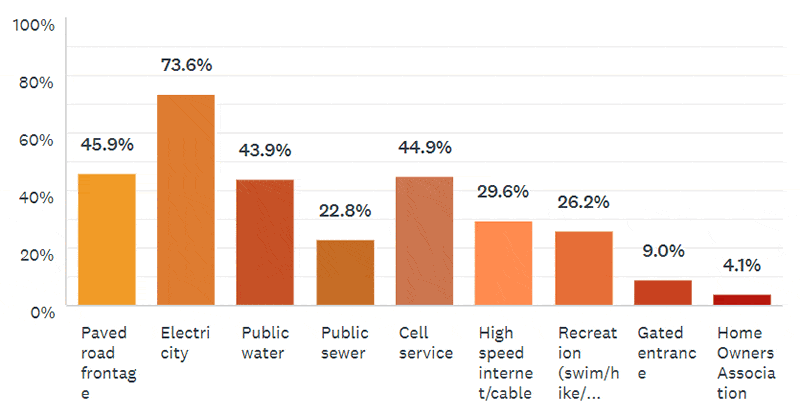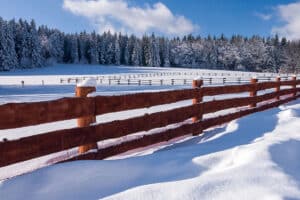Last month, the LANDTHINK Pulse posed the following question to our audience: What are the TOP 3 amenities you would look for when searching for property in a rural community?
February Pulse Sponsored by
Our informal online survey revealed that 73.6% of respondents say Electricity is the top logistical concern when searching for land in a rural community. When buyers begin searching for land within a rural community on land for sale sites such as LOTFLIP, they do so with the intention of eventually building on the lot. There are plenty of upsides to choosing a piece land and building later. For starters, you get to live where you want, in a home built to your specifications, on a piece of land that you have dreamed about owning. However, securing the land you want your house to stand on often presents a bigger challenge than the home construction process itself.
Based on the results of last month’s Pulse question, even if a buyer has identified a perfect piece of land, the absence of an electrical connection could be a deal breaker. Ideally, it’s best to purchase a lot in a rural community that already has utility connections. But if your ideal property is not yet connected to the power grid, buyers should keep in mind that it is possible to build on just about any homesite- assuming your budget can handle the challenges you might face during the process. If you prefer your electrical wires to be installed underground.
Electrical connection is generally more expensive than other utilities such as septic and water. While a temporary source of power can be established so construction can begin, a stable, permanent source of power is vital in order to be granted a Certificate of Occupancy. Fortunately for buyers, local utility companies will usually send an engineer to the property to calculate the expense, and the cost to run service to the property will vary according to factors such as:
- What is the distance from the nearest power pole to the house?
- Will power lines be run underground or overhead?
- Will new transformers need to be installed?
- How many poles will be needed? How much wire? Length of trenches?
- How much vegetation will need to be cleared?
The evaluation process for land you intend to build on comes with a different set of considerations than other types of land purchases. Evaluating Land You Intend to Build On in the Future, by Jennifer Beecher, with Mossy Oak Properties Coastal Land & Real Estate, offers some tips for rural land buyers and covers some of the not-so-obvious aspects involved in purchasing land. Buying any type of undeveloped land can hold numerous surprises and it’s the less visible details that could cost you extra money or even determine whether or not you can build on the land as planned.

According to 45.9% of the LANDTHINK audience, the second element they would look for when searching for property in a rural community is Paved Road Frontage. Typically, lots in rural communities don’t have access problems because developers work closely with the local planning departments to make sure the communities are designed and developed properly and have proper access to public or private roads. As part of due diligence, you will want to verify there is legal access either by public or private roads. Almost all major roads- interstates, highways, county roads, and city streets are public roads. Gated communities and private communities have private streets that a Home Owner’s Association (HOA) will be responsible for their maintaining.
Public roads give buyers the cleanest, guaranteed route to their property, where as private roads can introduce a number of problems. If the land isn’t accessible via a public road, it might not have access to city water or sewage. It’s a no-brainer why buyers prefer paved road frontage. Dirt and gravel roads promote less traffic, but buyers should factor in the inconvenience of having a home and a vehicle that stays dirty. There’s a reason for the common mantra “location, location, location” in real estate- it’s good advice. Building in a rural community with paved road frontage will also boost a home’s value for resale down the road.
The third most important amenity when selecting land in a rural community, according to 44.9% of respondents, was Cell Service. For buyers that decide to make their home in remote areas, cell service that is weak to none can be an issue. There are amplifiers and signal boosters on the market capable of improving cell phone service, but in order to work they need an existing cell signal to amplify. Boosters and amplifiers can also be complicated and expensive, and come with limitations.
Many any people live in areas where they must still rely on landlines to make calls, but whether it’s a concern for personal safety, limitations to working remotely, or simply social inconveniences, the lack of cell service in many rural areas is a significant concern to buyers searching for land in a community. But don’t let lack of a cell phone signal or internet keep you from pulling the trigger on a property you love. Seek advice from experts and it will most likely yield a solution that should work to keep you in touch with the outside world.
Performing proper due diligence before tendering an offer on any piece of property is the cornerstone of a savvy purchase and will minimize risk and costly surprises down the road. So, how do you know if you’ve found your dream property? Jonathan Goode, with Southeastern Land Group, compiled The Right 20 Questions for Land Buyers when performing due diligence on a property under consideration. Jonathan points out that buyers need to know their objectives for owning a rural property before they can know the right set of questions to ask.
A local land agent can be a tremendous resource for a buyer that chooses to engage their services. It helps to have someone on your side who specializes in rural land and knows the right questions to ask.
Last month’s survey question were all over the board, but an overwhelming 73.6% indicated that Electricity was the most important property amenity that would influence their search for land in a rural community. The second most important amenity, coming in at 45.9%, was Paved Road Frontage. The third most desirable utility (44.9%), was Cell Service. This was followed closely by 43.9% who said Public Water, 29.6% who said High Speed Internet/Cable, and 26.2% who said Recreation. Only 22.8% of our audience said Public Sewer. A mere 9.0% said that a Gated Entrance and a Home Owner’s Association (4.1%) were an important feature in a rural community.
We were pleased with the large number of Pulse responses, and we thank everyone who answered the Pulse and shared it on social media with friends and connections in the land industry. LANDTHINK would like to extend a big thank you to National Land Partners for sponsoring the February Pulse and for coming up with a very interesting question to pose to our audience. The primary vision of National Land Partners (NLP) is to help each person realize and achieve their dream of land ownership. Their professional land consultants serve as a guide to buyers find their perfect property. National Land Partners offers a “no pressure” approach to making the dream of land and home ownership an enjoyable event; buyers choose a preferred builder and develop their own timeline for constructing a home. Whether you are looking to buy or sell land, National Land Partners would love to hear from you.
Become a Pulse sponsor! It’s a great way to ensure your brokerage is the first one buyers and sellers call when they have a need to buy or sell property. You’ll get insane exposure on Social + Email + Web. That’s 500,000+ monthly eyes on you! Once you have it, you won’t want to give it up! Pulse sponsorships are offered on a first come first serve basis and are subject to certain limitations. If your business would be interested in sponsoring a Pulse question, please contact us soon.
Do you have a Pulse question you’d like to suggest? Submit your question and we might choose yours!
We want to know what you think about our March Pulse question, chosen and sponsored by LANDFLIP. If you had one million dollars to invest in a single property, which type would it be? Answer now.
This content may not be used or reproduced in any manner whatsoever, in part or in whole, without written permission of LANDTHINK. Use of this content without permission is a violation of federal copyright law. The articles, posts, comments, opinions and information provided by LANDTHINK are for informational and research purposes only and DOES NOT substitute or coincide with the advice of an attorney, accountant, real estate broker or any other licensed real estate professional. LANDTHINK strongly advises visitors and readers to seek their own professional guidance and advice related to buying, investing in or selling real estate.











Add Comment